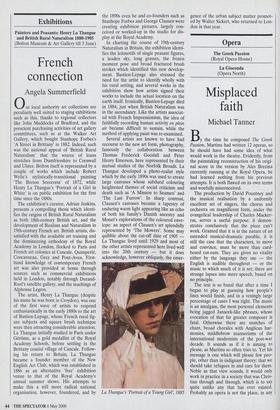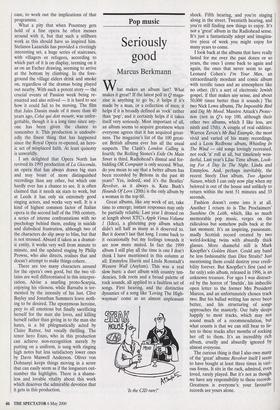Opera
The Greek Passion (Royal Opera House) La Gioconda (Opera North)
Misplaced faith
Michael Tanner
By the time he composed The Greek Passion, Martinu had written 12 operas, so he should have had some idea of what would work in the theatre. Evidently, from the painstaking reconstruction of his origi- nal score in the version by Ales Brezina currently running at the Royal Opera, he had learned nothing from his previous attempts. It is both flawed on its own terms and woefully misconceived.
The production by David Pountney and the musical realisation by a uniformly excellent set of singers, the chorus and orchestra on magnificent form, under the evangelical leadership of Charles Macker- ras, serves a useful purpose: it demon- strates conclusively that the piece can't work. Granted that it is in the nature of an extended musical-dramatic parable, it is still the case that the characters, to move and convince, must be more than card- board cut-outs. They are given no vitality either by the language they use — the English is audible throughout — or the music to which much of it is set; there are strange lapses into mere speech, based on no principle.
The text is so banal that after a time I began to play at guessing how people's lines would finish, and in a vexingly large percentage of cases I was right. The music is an amalgam, the most personal elements being jagged Janacek-like phrases, whose evocation of that far greater composer is fatal. Otherwise there are snatches of chant, broad chorales with Anglican har- monies, middlebrow mannerisms of the international modernists of the post-war decade. It sounds as if it is aiming to please, as Martinu so often tries to. Yet his message is one which will please few peo- ple, other than in indignant theory: that we should take refugees in and care for them. Noble as that view sounds, it would only work in practice in a society that was Chris- tian through and through, which is to say quite unlike any that has ever existed. Probably an opera is not the place, in any case, to work out the implications of that programme.
What a pity that when Pountney gets hold of a fine opera he often messes around with it, but that such a stillborn work as this should have so inspired him. Stefanos Lazaridis has provided a rivetingly interesting set, a huge series of staircases, with villagers or refugees, according to which part of it is on display, teeming on it as on an Escher drawing, seeming to arrive at the bottom by climbing. In the fore- ground the village elders drink and smoke on, regardless of the dramas being played out nearby. With such a potent story — the crucial events of Passion week being re- enacted and also relived — it is hard to see how it could fail to be moving. The film that Jules Dassin made of it more than 40 years ago, Celui qui doit mourir, was unfor- gettable, though it is a long time since any- one has been given the chance to remember it. This production is undoubt- edly the finest thing that has happened since the Royal Opera re-opened, an hero- ic act of misplaced faith. At least quixotry is unworldly.
I am delighted that Opera North has revived its 1993 production of La Gioconda, an opera that has always drawn big stars and may boast of more distinguished recordings than any other, but which one hardly ever has a chance to see. It is often claimed that it needs six stars to work, but at Leeds it has only six extremely good singing actors, and works very well. It is a kind of highest common factor of Italian opera in the second half of the 19th century, a series of intense confrontations with no psychology behind them, ending in suicide and diabolical frustration, although two of the characters do slip away to bliss, but that is not stressed. Absurd if taken as a dramat- ic entity, it works very well from minute to minute, and the updated staging by Philip Prowse, who also directs, realises that and doesn't attempt to make things cohere.
There are too many characters around for the opera's own good, but the two vil- lains are well differentiated in this interpre- tation, Alvise a snarling proto-Scarpia, enjoying his vileness, while Barnaba is tor- mented by the intensity of his lust. Clive Bayley and Jonathan Summers leave noth- ing to be desired. The eponymous heroine, prey to all emotions but finally sacrificing herself for the man she loves, and killing herself rather than giving in to the man she hates, is a bit phlegmatically acted by Claire Rutter, but vocally thrilling. The tenor hero Enzo, who in this production can achieve non-recognition merely by putting on a uniform, is sung with ringing high notes but less satisfactory lower ones by Davis Maxwell Anderson. Oliver von Dohnanyi keeps things moving in a score that can easily seem as if the longueurs out- number the highlights. There is a shame- less and lovable vitality about this work which deserves the admirable devotion that it gets in this production.



































































 Previous page
Previous page